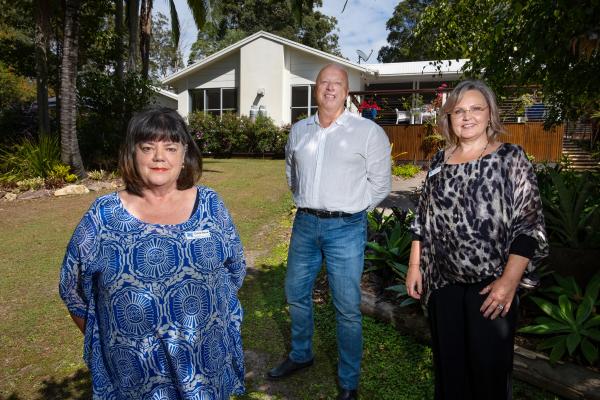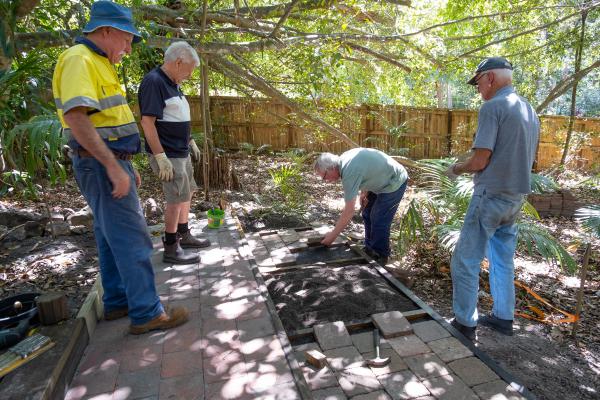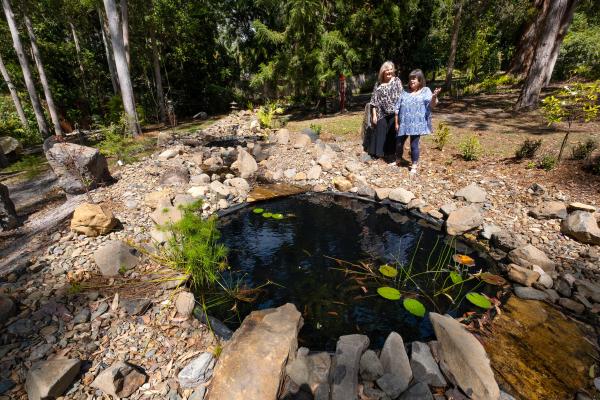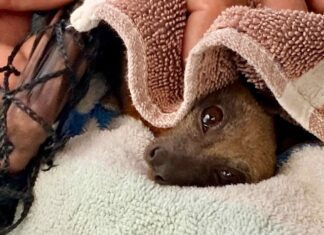PRECEDE: Noosa’s unique home-style end-of-days hospice is facing its own potentially terminal crisis. Phil Jarratt reports on the fighting spirit that keeps Katie Rose Cottage Hospice going.
It’s strange how we spend our entire lives knowing that death will come to us all, and yet most of us understand so little about the process, avoid the subject whenever possible and shy away from thinking about how to plan the best possible ending to a life well lived.
These thoughts occurred to me on a warm spring morning last week when I stood in the gardens of Katie Rose Cottage Hospice, admiring the work of dozens of volunteers in creating a leafy and tranquil perimeter around the kind of relaxed, airy indoor-outdoor house that I’ve spent most of my life in. Having been given the tour of the hospice by Katie Rose chairperson Carol Raye, I knew that behind the three doors I could see in the distance, people were dying, but that filled me not with trepidation, but with one clear thought: when the time comes, this will do nicely.
This is a common reaction of first-time visitors to the serene Doonan hospice that last month celebrated its second birthday as a 24/7 facility, and of the 93 family groups whose loved ones have spent their final days there over the two years.
Before visiting Katie Rose, I spoke to Mrs Leigh Fortington, whose husband, Ted, had just spent his final days there. “I was blown away by the amazing care that was given to Ted and myself by the staff,” she said. “I felt so blessed to have my beloved husband receive the very highest level of compassionate and loving care during the last few days of his life. They even allowed our devoted dog to lie on the bed with Ted! The compassion and love for each of us was amazing.”
The beautiful Beddington Road property in the Noosa hinterland is home to the second incarnation of Katie Rose Cottage, a not-for-profit company formed four years ago when volunteers at the first Katie Rose decided to rescue the idea from a wreckage caused by mismanagement and lack of funds.
Carol Raye had recently arrived to retire in Noosa with her airline pilot husband, but after a long and successful career in South Australia working in marketing and fundraising for not-for-profits like St John’s Ambulance, she wasn’t quite ready to make the garden her life. John Gabrielson had come from an equally successful career working in public health at the state and local level in Western Australia, and had gravitated too volunteering in his new community. Both had the skills and experience to see a way forward for Katie Rose, and together they had the passion to make it happen.
The new company secured the Katie Rose name, formed a board and applied for a licence to operate, but the biggest breakthrough was the decision of Noosa retirees Peter and Mac Williams to donate a million dollars for the purchase of a suitable property. They created the Warm Handshake Foundation for the purpose of making the donation. Says Carol Raye: “Peter didn’t want it to be a cold handshake from the grave, he wanted it to be a warm handshake, to be able to see his money at work, to give us the security of a base, and to watch it grow. I think it’s a beautiful philosophy and I know there are a lot of philanthropists in our community who feel the same. You could sum it up as, ‘give where you live’.”
Another way of putting it might be, give where you’d like to die.
So Peter and Mac helped Carol and John and their core group select the perfect property, on a leafy bend of Beddington Road with plenty of room to create beautiful gardens and, even more importantly, expand to meet demand for their unique free service. The new hospice started full operations in August, 2018, and in June, 2019, received accreditation from National Safety and Quality Health Service Standards.
Says CEO John: “There are six other hospices in Queensland but our point of difference is that we’re just one step from being at home, whereas the others have that clinical feel about them. The research tells us that 75 percent of people want to die at home but only 14 percent get to. They want to die with family and friends, not in a hospital. Our concept is based on the English model, where most towns and villages have a hospice tradition that dates back to times when people would take in a sick neighbour.”
Carol: “And that’s why families love it. They can bring the family dog in, they can have parties, we’ve even had weddings out in the garden. The end of life is a journey that we all face, and it’s a time when you don’t want to be worrying about how you’re going to pay for your partner’s last days. A lady recently brought her husband in, and I could immediately see the relief on her face. She said to me a few days later, ‘I can’t tell you how much it means to me to go back to being his wife, not his carer.’”
Carol also shared the poignant story of two husbands, separated by more than a generation but united as temporary residents of Katie Rose while their wives died of cancer. “They formed a real bond, despite the large age difference, and when the wives went to sleep in the evenings they’d come out and share a barbeque and a couple of beers on our deck, and just chat. That’s the kind of service we provide, and must continue to provide.”
At the beginning of 2020, despite still having to meet 80 percent of their $1.4 million annual costs through their own initiatives, Katie Rose was in a good place, with revenue from four op shops bringing in more than $500,000 a year, an army of 280 volunteers helping maintain the hospice and run the shops, and professional fundraiser Katrina Dargie, with 25 years’ experience in corporate law, joining the team. Then Covid-19 hit.
The op shops were forced to close for the six-week lockdown, most of their fundraising events had to be cancelled and donations dried up. It’s typical of the can-do spirit that drives this place that Katie Rose managed to function 24/7 throughout the worst of the pandemic, thanks to JobKeeper and the generosity of many nurses who worked shifts for nothing.
But now, more than ever, Katie Rose needs community support.
While the op shops have reopened and Katrina says they are getting creative about fundraising events that don’t require mass gatherings, the reality is that the first three months of Covid snipped more than $100,000 from their revenue streams and they are fighting for survival.
Says Carol: “Philosophically this is not a good time to be out there asking people to donate when so many are suffering financially, so my message to the community as chair of Katie Rose Cottage Hospice is thank you, because you have put us here, and you’ve helped us to stay here, so please don’t forget us.”
Katie Rose needs donations of both cash and goods to sell in their shops. Donor programs range from a dollar a day supporter donation to assist with nursing wages, to the $1000 Challenge. Visit www.katierosecottage.org.au for more information.









![[READER COMPETITION] – Win a family ticket to Hudsons Circus](https://noosatoday.com.au/wp-content/uploads/2026/02/Hudsons-circus-1-100x70.png)
